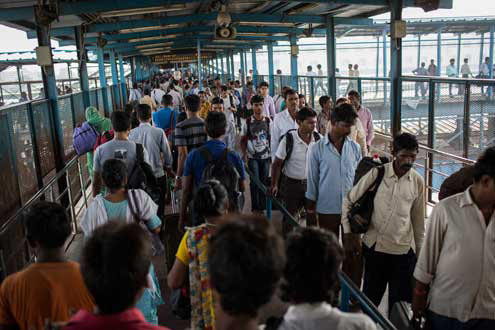
On May 15, as buzz from India’s historic election reached a high the day before results were announced, The Asia Foundation, in partnership with the Centre for Policy Research (CPR) in Delhi, launched the SARCist, a comprehensive online resource center dedicated to the issues facing South Asia regional cooperation. The launch was particularly timely as India, after 10 years of incumbent government, was gearing up for a wave of change that will undoubtedly impact the entire region.
Intraregional trade accounts for just 5 percent of the total trade flows in South Asia, making it one of the least integrated regions in the world. This region is home to almost one-quarter of the world’s population and 40 percent of the world’s poor, and stark inequalities for women and other minorities continue to leave people behind and limit growth and opportunity. Easier flow of people and goods has the potential for inclusive growth for all of the countries in the region. However, without more effective policies that facilitate greater regional cooperation, the nascent informal economy will continue to persist, which puts people at risk, feeds corruption, and exacerbates criminal behavior, including human trafficking.
To address the need for better regional cooperation in South Asia, last year The Asia Foundation began supporting the Centre for Policy Research to develop the SARcist. Informed by some of the region’s most progressive and renowned experts, the SARCist is a virtual knowledge platform that can be used for policy advocacy focused on promoting trade and investment flows in South Asia. By bringing together think tanks inside and outside of South Asia working on regional cooperation, the SARCist aims to become a one-stop-shop for policy reports, data analysis, news, and events related to the region. The online space will also connect scholars, practitioners, and researchers through discussion and debates on key issues related to regional cooperation. Through knowledge creation and sharing the SARCist endeavors to become a tool to expand the debate, dialogue, and policy change for a more integrated South Asia.
Panelists at the event included SARCist advisory board members Professor Mustafizur Rahman (Center for Policy Development, Bangladesh), Kanak Mani Dixit (Himal South Asia, Nepal), Abid Qaiyum Suleri (Sustainable Development Policy Institute, Pakistan), Saman Kalegama (Institute for Policy Studies, Sri Lanka), and Rajiv Kumar (CPR, India). India’s Joint Secretary for the Department of Commerce, Arvind Mehta, inaugurated the launch event, and spoke about the need to look at opportunities in hydro, solar tourism, and other industries to boost trade in the region. He said that India’s economy has the capacity to absorb much more trade with countries in South Asia than it currently is, which in turn could be a catalyst to not only advance economies but also to address poverty. He also said that dialogue between commerce secretaries of India and Pakistan are in progress and could serve as a roadmap for better economic cooperation.
Each of the advisory board members spoke about their country contexts and the need for better regional cooperation that allows people-to-people movement and trade without non-tariff barriers. Professor Rahman stressed the need for enhanced cooperation among different states within India and the countries that these states border, such as the northeast of India and Bangladesh where currently people and products move back and forth without any policy in place that could boost trade between the two countries. Similarly, Mr. Dixit talked about the diversity of the South Asia region and the “north/south divide,” which have their own set of challenges that need to be addressed.
Looking forward, the Foundation will work with organizations and experts to expand the scope of this important initiative, including incorporating the Foundation’s work in addressing non-tariff barriers to trade in South Asia in order to contribute to the research, advocacy, and discourse on advancing regional cooperation in this region.
For more information, visit The SARCist at www.thesarcist.org.
Reecha Upadhyay is a program officer in The Asia Foundation’s India office. She can be reached at reecha.upadhyay@asiafoundation.org. The views and opinions expressed here are those of the individual author and not those of The Asia Foundation.
Source: Asia Foundation








